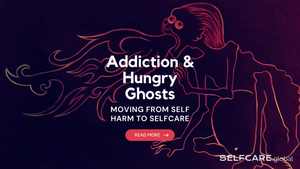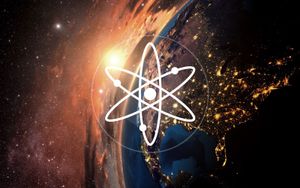Breaking Free from the Chains That Bind Us
Have you ever felt that no matter what you acquire, achieve, or consume, you're still left with a gnawing emptiness inside? That persistent feeling of disconnection isn't something wrong with you—it's a universal human experience that ancient wisdom traditions recognized thousands of years ago.
The Buddhist Wheel of Life (bhavachakra) shows us six realms where beings can exist, each representing different states of mind and being. Today, I want to focus on one realm that perfectly captures our modern struggle with addiction and unfulfillment: the Realm of Hungry Ghosts.
When I first encountered the Buddhist concept of "Hungry Ghosts"—beings with enormous appetites but painfully narrow throats who can never satisfy their hunger—I immediately recognized this as the perfect metaphor for our modern epidemic of addiction, burnout, and profound disconnection.
The 3 Major Challenges We're Here to Solve Together
- The Endless Cycle of Unfulfillment: How to break free from constantly seeking the next fix, purchase, or achievement that promises satisfaction but never delivers.
- Mistaking Self-Harm for Self-Care: Recognizing when our coping mechanisms have become part of the problem rather than the solution.
- The Root Causes of Disconnection: Addressing the deeper wounds and voids that drive addictive behaviors instead of just treating symptoms.
Would you be open to exploring a new path? One where you're no longer a passenger in your own life, constantly reacting to cravings and impulses, but instead becoming the driver who charts the course toward genuine fulfillment?
Join our SelfCare community where thousands are walking this path together, supporting each other through every step of the journey.
The SelfCare Framework: Learn-Do-Embody-Teach
1. LEARN: Understanding the Hungry Ghost Within
The realm of hungry ghosts isn't just an ancient Buddhist concept—it's a psychological reality that modern science is finally catching up to. As Dr. Gabor Maté explains in his groundbreaking work, addiction isn't about the substances or behaviors themselves but about the pain they temporarily relieve.

The Six Realms of the Wheel of Life
The Buddhist Wheel of Life depicts six realms where we can find ourselves:
- The Animal Realm - Where beings are driven by basic survival needs. In our modern context, this represents the 80% of people living on less than $10 a day, driven primarily by essential needs like food and shelter.
- The Hell Realm - A place of constant suffering and torment. As Jim Carrey noted when discussing overcoming depression, this is where we live as a character we were never born to be. Here, "hurt people hurt people."
- The Realm of Hungry Ghosts - Where beings have enormous appetites but tiny throats, never satisfied despite constant consumption. This represents our culture of addiction and constant craving.
- The Human Realm - Where we treat others with compassion and empathy. This is the only realm where transformation and liberation are possible.
- The Demigod Realm - Where beings fight for power. Think corporate greed, government conflicts, and the "profits over people" mentality.
- The God Realm - Where beings enjoy pleasure but develop attachments and complacency, missing opportunities for growth.
Russell Brand's journey through addiction illustrates the hungry ghost realm perfectly. At the height of his substance abuse, he lost jobs, relationships, and was arrested 12 times. But what was he really seeking? Not the drugs themselves, but relief from inner turmoil—a way to fill the void.
The research is clear: addiction develops when we consistently turn to something outside ourselves to alleviate inner feelings of unease. These can range from mild discontent and anxiety to intense emptiness, depression, and self-hatred.
2. DO: Small Steps Toward Freedom
What if I told you that liberation begins with a simple recognition? The moment you identify which of the Six Realms you're currently operating from—whether it's the Hungry Ghost realm of endless craving or the Hell Realm of constant suffering—you've already begun your journey to freedom.
Here are three small actions you can take today:
- Pause before each "fix" and ask: "What am I really hungry for in this moment?"
- Identify your highest values using Dr. John Demartini's approach to understand what truly fills your cup
- Create one small daily practice that aligns with your authentic values rather than temporary cravings
As Russell Brand discovered through his recovery, "Under the guidance of a mentor, with the support and community of other people on the same path, you have the ability to break free from your prior confinement and become a different person." The person you were truly born to be.
3. EMBODY: From Self-Harm to Self-Mastery
The journey from hungry ghost to human embodiment isn't about perfect execution—it's about authentic integration where your practices become inseparable from your being.
May I ask—which version of yourself do you want to embody? The one perpetually trapped in cycles of craving and temporary satisfaction? Or the one who has found freedom by addressing the root causes of disconnection?
In the SelfCare Book, we explore how to transform your relationship with pleasure, purpose, and presence so that fulfillment comes from within rather than from external sources that leave you feeling empty.
4. TEACH: Creating Ripples of Transformation
Once you've begun to fill your own cup, you naturally create ripples that extend beyond yourself.
Remember: the most powerful teaching comes not from words but from embodiment—from living as an example of what's possible.

Russell Brand now helps countless others navigate their own recovery journeys, not by preaching perfection but by sharing his ongoing process with vulnerability and authenticity.
Your Next Step: From Hungry Ghost to Human Fulfillment
The Buddhist wheel of life shows us that of all six realms, the human realm offers the unique opportunity for liberation. Neither so pleasurable that there's no motivation to seek change (like the god realm), nor so painful that escape seems impossible (like the hell realm).
This human experience—with all its challenges and possibilities—is our opportunity to break free from the hungry ghost cycle and find lasting fulfillment.
Moving Between Realms: Your Path to Liberation
Would you be curious to learn the complete 8-step process for breaking the cycle of addiction and emptiness? The framework I've developed combines ancient wisdom with modern neuroscience to create a practical path toward authentic fulfillment.
To take the next step on your journey, join our SelfCare community where you'll find support, guidance, and practical tools for embodying your authentic self. Or explore the complete framework in the SelfCare Book, where each chapter offers another piece of the liberation puzzle.
Key Research References:
Level 1 evidence - Systematic reviews
- Goldberg SB, Tucker RP, Greene PA, et al. Mindfulness-based interventions for substance use disorders: a systematic review and meta-analysis. Substance Abuse and Rehabilitation. 2018;9:103-114.
- Grant JE, Potenza MN, Weinstein A, Gorelick DA. Introduction to behavioral addictions. American Journal of Drug and Alcohol Abuse. 2010;36(5):233-241.
- Li W, Howard MO, Garland EL, McGovern P, Lazar M. Mindfulness treatment for substance misuse: A systematic review and meta-analysis. Journal of Substance Abuse Treatment. 2017;75:62-96.
Level 5 evidence - Accredited Health Experts cited
- Dr. Gabor Maté - "In the Realm of Hungry Ghosts: Close Encounters with Addiction"
- Dr. John Demartini - Values and Voids framework
- Russell Brand - "Recovery: Freedom from Our Addictions"
Other
- Buddhist Wheel of Life and Six Realms concept - Traditional Buddhist teachings
- The Hungry Ghost metaphor - Buddhist psychology
- Values Assessment - https://www.selfcare.global/values-assessment/
REFERENCES
This is directly referenced from the Amazon best-selling SelfCare Book "Lifestyle Medicine For the People" by Rory Callaghan. If you would like to read more content like this, grab the free online chapters of the book or a hard copy.
We have done our best to reference everyone's expert opinions, peer-reviewed science, and original thoughts, all references available here and referenced in the text.
We also understand that most thoughts are not our own and there is a collective unconsciousness, unconsciousness, and universal mind stream of energy that is always at work. How our references are sorted and filtered is here.
This article is for informational purposes only and should not replace professional medical advice. Always consult with your healthcare provider before beginning any new health regimen.




